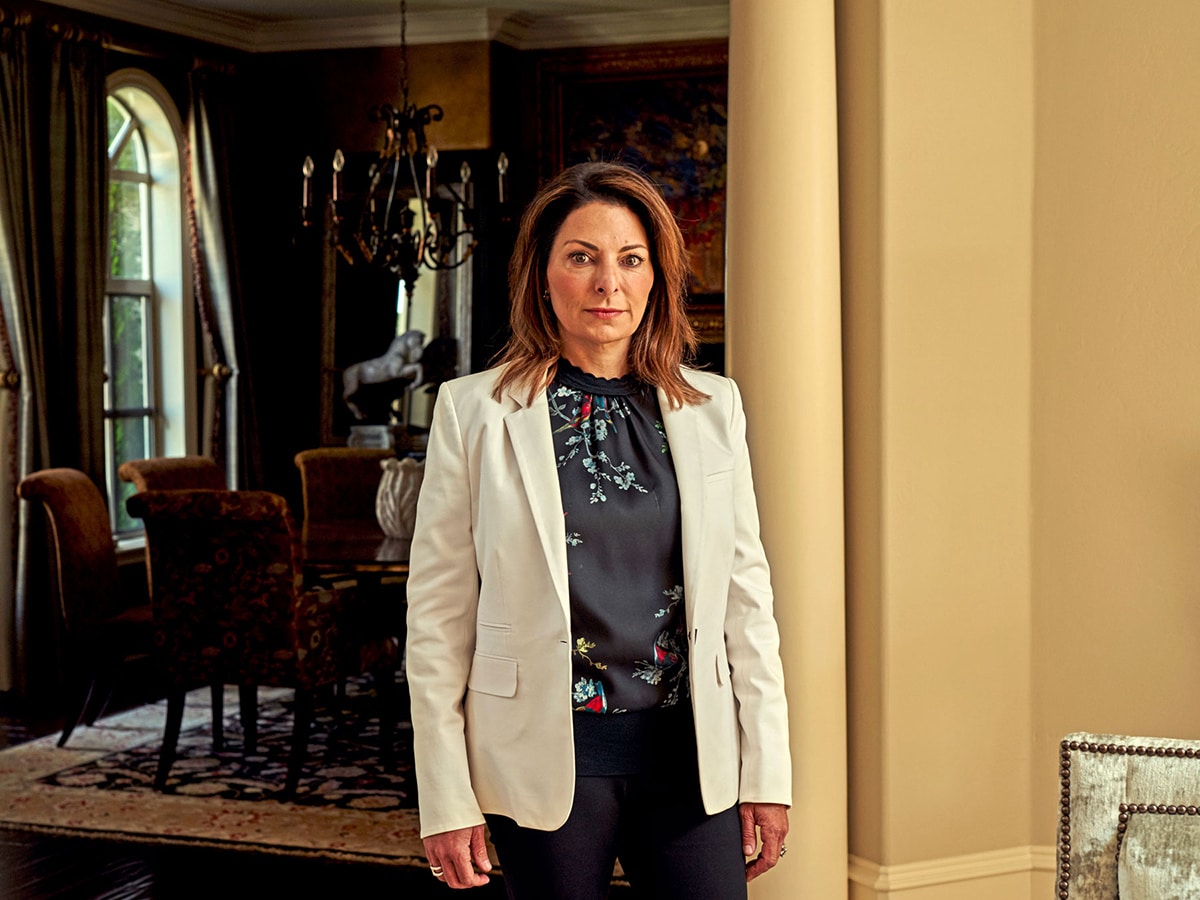Despite being just 08:00, it had already been an action-packed morning for Heidi Khashabi Ridley on the day she picked up the phone to Opto in early August.
Ridley had already spent hours speaking to those involved in a panel about gender pay disparity that she was to moderate. It’s a subject that — as you might expect from the co-founder of an ESG focused fund — is close to Ridley’s heart. She has spent much of her career advocating for diversity and inclusion alongside broader ESG issues. “We're now in a world where we're making a very strong economic argument [when it comes to diversity and inclusion], and one might wonder why we need to work so hard to defend [it],” she says, reflecting on the morning's discussion. "I find that perplexing, but at the same time, I'm not sure there are many excuses left.”
Considering the topic of diversity and inclusion, Ridley says that a shift in focus in started to take place in the past two years, as leaders begun to realise the positive benefits that investing along these themes can bring. “People were coming at it more from an equity, an equality [and] a fairness angle — you're giving people equal opportunity,” Ridley explains. “More recently, you've seen it starting to dovetail with ESG,” she continues, saying that the discussion has now shifted to one about “good governance and good business practice and that it’s just the right way to run a business”.
However, Ridley says there is still a common fallacy at the heart investing — despite more and more studies debunking such notions — that returns need to be sacrificed in order to advance social and or environmental agendas. In starting Radiant ESG, Ridley is challenging this train of thought. “If we can [get good returns] with a diverse and minority-led firm, because we think we can actually make better decisions that better reflect our client base, then why wouldn’t we do that? Why is there pushback there?”
“If we can [get good returns] with a diverse and minority-led firm, because we think we can actually make better decisions that better reflect our client base, then why wouldn’t we do that? Why is there pushback there?”
Having spent three years as global CEO of Rosenberg Equities — the famed quant arm of AXA Investment Managers — Ridley decided to go her own way and with fellow Rosenberg Equities alumni Kathryn McDonald, formerly head of sustainable investing at the firm, founded Radiant ESG in June 2020. The company, which at the time of writing is in the process of finding a partner to launch its asset management business, runs ESG and impact consulting for institutional clients. Ridley says the co-founders see both asset management and consulting as important ways to continue to push the dialogue on ESG.

Information leading insights
Ridley recalls that during her time leading Rosenberg Equities she learnt some important lessons about company culture that she hopes to develop at Radiant ESG. Chief among these concepts was that of remaining authentic. “I want us to walk the talk just like we did at Rosenberg Equities,” Ridley says. “There's still too many efforts to mould yourself into what you think the client wants or where the flows will go on in a way that I think starts to get people into trouble.” She says that when speaking to clients it is important to talk about what you believe in and ideas that you practice. At Radiant ESG Ridley wants to augment what the firm is doing from an investment perspective — as investments results have to be the “guiding compass” — with a culture and community that is doing all it can be doing to progress ESG issues.
Another crucial factor to Ridley’s ethos that she has brought to Radiant ESG is the understanding that having data is not the same as having the information. “Anyone can have data,” she says. “But interpreting it and extracting actionable insights is where we believe we have the advantage.”
This has helped inform Radiant ESG’s strategic focus. Ridley says that by virtue of the fact she believes that certain company features have proven to deliver better risk-adjusted returns than a market cap index, so Radiant ESG’s flagship will look to extract the strong characteristics of these companies. Named Sustainable Future — the first of two key strategies Radiant ESG will launch with — this flagship is what Ridley describes as a combined integrated, adaptive, quality ESG strategy. This will focus on identifying companies that will create and sustain value over a long horizon. The strategy, Ridley says, is inherently high capacity, which will make it an attractive proposition for large institutional investors and sub-advisory and wealth management platforms. This, she thinks, will help drive scalable growth.
The second key strategy, named Sustainable World, is more targeted and thematic. It focuses on companies with exceptional green credentials and that align with the UN Sustainable Development Goals. Specifically, Radiant ESG is looking for companies that are prioritising goals seven – ensuring access to affordable, reliable, sustainable and modern energy for all – and 13 – the need to take action to combat climate change and its impacts. One such example is Vestas Wind Systems [VWS]. The company has favourable ESG ratings that include good gender representation in leadership roles. It is attractive to Radiant ESG because it has done well in capturing market share while maintaining margins, even as competition adds pressure.

Seeing the wood and the trees
Fundamental to both approaches is how Radiant ESG assesses the impact of ESG issues on investing. “We think that companies face threats and opportunities related to ESG and that needs to be a core part of a sound investment decision and investment practice,” Ridley says.
There is a lurking hazard at the heart of ESG integrated strategies, however. “There’s certainly a fair share of greenwashing. Let’s just call it out,” Ridley acknowledges. Although there may be a “heavy temptation on the part of fund providers to do a little window dressing”, Ridley says funds that do this aren't really “considering ESG through a true investment lens”.
“There’s certainly a fair share of greenwashing. Let’s just call it out”
Furthermore, heavy-handed, exclusion-based standards also need to be avoided. Such approaches can have “binary outcomes” that can often fail to recognise the potential of some companies. “You could penalise them today for what they’re doing, or you could look at ESG momentum — how we expect them to evolve and how quickly.” Ridley wants to avoid the “dyed in the wool” types that won’t change. One such example given is Altria [MO], which Radiant ESG thinks has shown an inability or unwillingness to diversify away from tobacco products. The company sees Altria as representing undercompensated risks and that it has baggage that other more attractive defensive stocks do not.

Attention, Ridley says, should be paid to companies making a genuine commitment to positive progress. These companies need support to encourage the transition to better practices. She points to big utilities companies: they may still be net users of fossil fuels, but they’re making positive moves towards alternative energies. To exclude such companies to invest in only in top-rated ESG names runs the risk of investment firms forsaking their chance to bring about the change they strive for — not to mention missing out on opportunities. “We want to take an evolutionary view because we want to position ourselves best to capture the opportunities that are inherent in ESG ideas, and direct investments toward companies that are using their resources wisely and demonstrating a willingness and commitment to change,” Ridley explains.
“We want to take an evolutionary view because we want to position ourselves best to capture the opportunities that are inherent in ESG ideas, and direct investments toward companies that are using their resources wisely and demonstrating a willingness and commitment to change”
The fate of ESG
A lack of uniformity across the industry when it comes to assessing a company's ESG credentials makes for a complex picture. Some companies that may be rated highly in one or of the E, S and G may fail miserably in the others. The multitudinous issues to address when it comes to the environment, society and governance make for a long list.
Crucial to Radiant ESG’s approach is the mechanisms it has in place to ensure it does not fall foul to greenwashing, nor that it misses the mark on assessing those companies that are on the right path to incorporating worthwhile ESG principles. “You absolutely have to get into the nitty-gritty, granular level of detail and dig into the facts, and not just rely on published scores by third-party providers,” Ridley explains. There is no cookie-cutter approach and the simplest notion, she says, is that the individual must understand the details as they relate to their investment strategy. This also puts an onus on asset owners, Ridley states, who should understand who they’re investing with and how they incorporate ESG principles.
But this doesn't mean Ridley is against standardisation. “We have to advocate for required timely standardised information from companies. Just like there are financial accounting standards, there needs to be sustainability standards.”
“We have to advocate for required timely standardised information from companies. Just like there are financial accounting standards, there needs to be sustainability standards”
After all, this information is important to investors and in turn, it is these investors that can ultimately decide the direction of the companies in which they’re investing. “People wonder how you really can engage and influence companies. You can, through voting with the capital that is in your hands,” Ridley says.

Social media’s impact on investing
Social media is a critical, development in the investing landscape — particularly when it comes to ESG. “It's patently clear that environmental, social and governance criteria affect company brands, their ability to retain workers and their resilience in the face of competitive forces,” Heidi Khashabi Ridley, co-founder of Radiant ESG says. “With the emergence of social media and the immediate access to information, you’ve started to see very quickly the impact on companies' stock prices from those running afoul of ESG related issues.” She points to issues such as labour practices, which through social media “get spread like wildfire”.
“With the emergence of social media and the immediate access to information, you’ve started to see very quickly the impact on companies' stock prices from those running afoul of ESG related issues”
The situation with Facebook in June exemplifies this market dynamic. The company’s share price slumped after a number big name brands, including Coca Cola [KO], Unilever [UL], Levi Strauss [LEVI] boycotted the company in solidarity with Black Lives Matter. This is illustrative of the effect that companies running afoul of what Radiant ESG refers to as a “social license to operate” has on share price. In this instance, “investors can draw a straight-line relationship between the boycott and earnings,” but it also shows “a new sensitivity on the part of consumers to the role of the corporation in society”.
The social media information landscape is crucial, Ridley says, because companies “do not operate in a vacuum, but rather in an ecosystem”. Whereas the process in the past was to focus on a company’s financials in comparison to those of its competitor, now the import is of a company “in relation to other companies, to society, to its natural and social resources” — what Ridley calls “philosophical orientation”. Understanding and analysing these “short-horizon insights” is useful as investors can “increasingly see the influence of shareholders and other constituents through social media”.
Disclaimer Past performance is not a reliable indicator of future results.
CMC Markets is an execution-only service provider. The material (whether or not it states any opinions) is for general information purposes only, and does not take into account your personal circumstances or objectives. Nothing in this material is (or should be considered to be) financial, investment or other advice on which reliance should be placed. No opinion given in the material constitutes a recommendation by CMC Markets or the author that any particular investment, security, transaction or investment strategy is suitable for any specific person.
The material has not been prepared in accordance with legal requirements designed to promote the independence of investment research. Although we are not specifically prevented from dealing before providing this material, we do not seek to take advantage of the material prior to its dissemination.
CMC Markets does not endorse or offer opinion on the trading strategies used by the author. Their trading strategies do not guarantee any return and CMC Markets shall not be held responsible for any loss that you may incur, either directly or indirectly, arising from any investment based on any information contained herein.
*Tax treatment depends on individual circumstances and can change or may differ in a jurisdiction other than the UK.
Continue reading for FREE
- Includes free newsletter updates, unsubscribe anytime. Privacy policy





